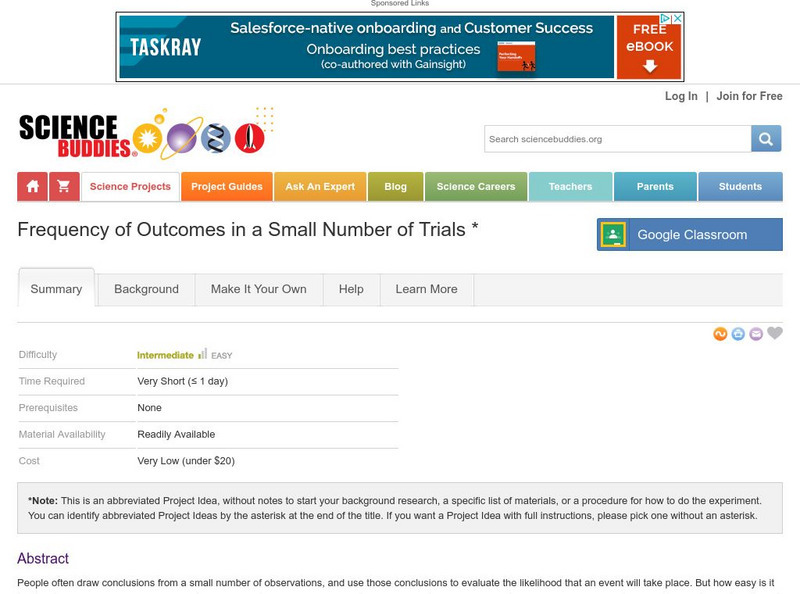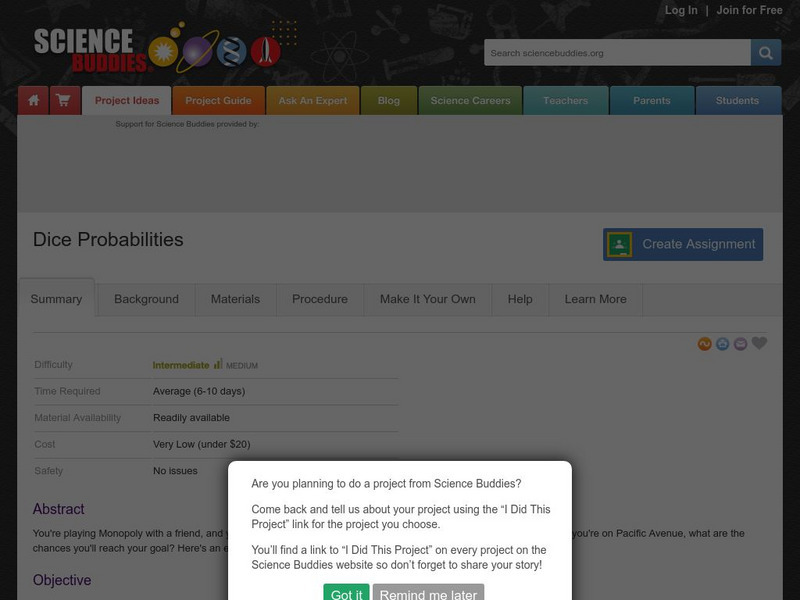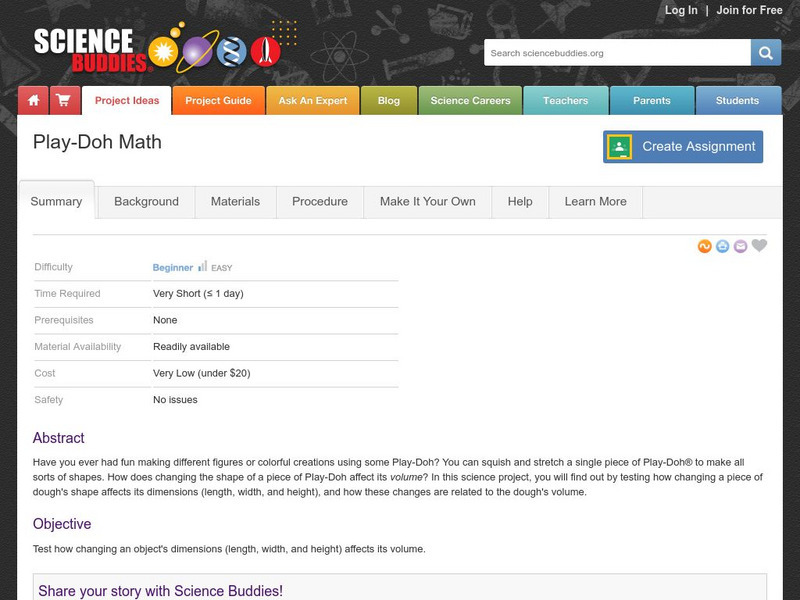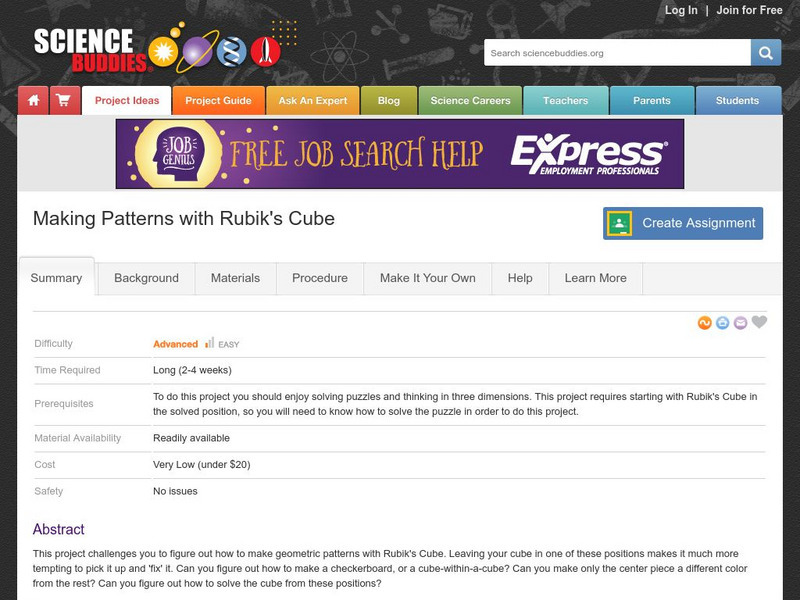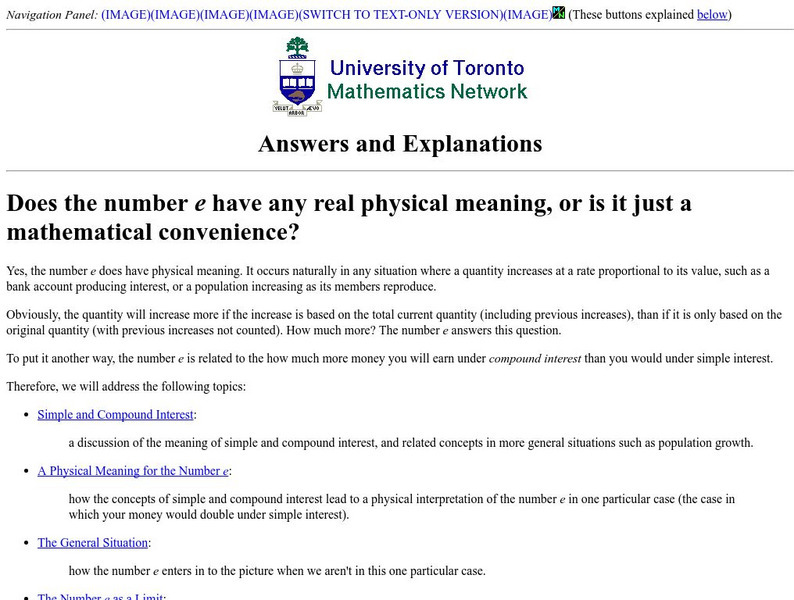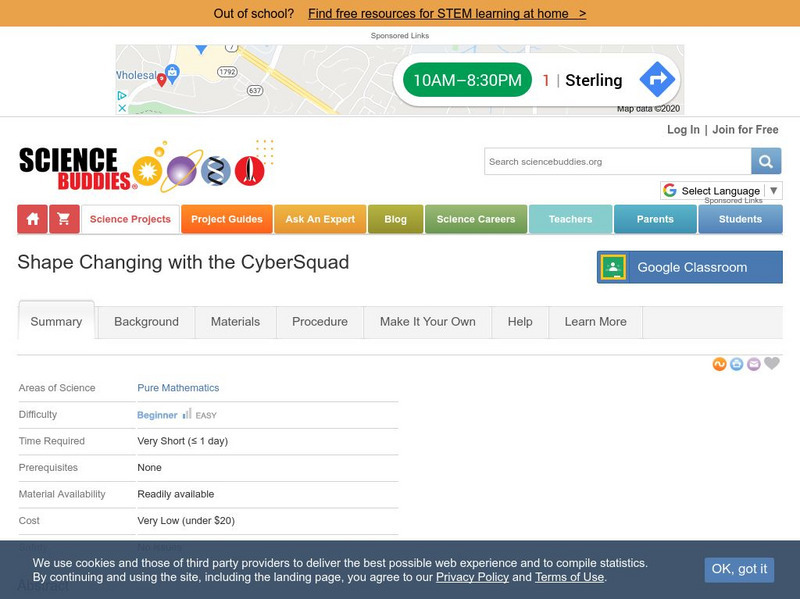Hi, what do you want to do?
Science Buddies
Science Buddies: Chain Reaction: Inversion and the Pappus Chain Theorem
Here is a challenging problem for anyone with an interest in geometry. This project requires background research to solve it, but it is an excellent illustration of visual thinking in mathematics.
Science Buddies
Science Buddies: Taking Off on a Tangent
This is an interesting geometry project that goes back to the time of Archimedes, the famous Greek mathematician. You can combine this mathematical project with computer science and take this ancient problem into the twenty-first century...
Science Buddies
Science Buddies: Frequency of Outcomes in a Small Number of Trials
People often draw conclusions from a small number of observations, but how easy is it to draw the wrong conclusion? Here is a simple project that shows the importance of making enough observations before making a prediction.
Science Buddies
Science Buddies: Dice Probabilities
You're playing Monopoly with a friend, and you've already got Park Place and you really, really want to get Boardwalk. If you're on Pacific Avenue, what are the chances you'll reach your goal? Here's an easy project that will show you...
Science Buddies
Science Buddies: Throwing You Some Curves: Is Red or Blue Longer?
This a straightforward, but interesting, project in geometry. It is a good first proof to try on your own. You should be able to figure it out by yourself, and you'll gain insight into a basic property of circles.
Science Buddies
Science Buddies: Estimation and Population Size
Have you ever wanted to take a short cut? How about when doing your math homework? In this experiment you can learn how estimation can save you time doing math calculations. But beware, some estimations are better than others. Can you...
Science Buddies
Science Buddies: Measuring Up
Measurements are very important for scientists. It is especially important that the measurements be accurate. Think about how important accuracy is when you want to know if you are taller than a friend of yours, every inch counts. In...
Science Buddies
Science Buddies: Pick a Card, Any Card
No matter what your favorite card game is, we all wish we could use psychic powers to draw the card we want on our turn. You may not have psychic powers, but you might have the power of probability on your side. Do this experiment and...
Science Buddies
Science Buddies: Play Doh Math
One piece of Play-Doh can make many different shapes. Even though you can change the shape by squishing or stretching the Play-Doh, it is still the same size unless you add or take away some of the dough. Try this experiment to test how...
Science Buddies
Science Buddies: Juice Box Geometry
Juice boxes are so convenient, just poke the straw in and sip away. It might surprise you how much thought goes into the design and manufacturing of a juice box. Each manufacturer has carefully calculated how big each side should be to...
Science Buddies
Science Buddies: M&m Math
By using a simple bag of M&Ms, you can conduct an experiment in statistics to determine the frequency of colors in the package. The Science Buddies project ideas are set up consistently beginning with an abstract, objective, and...
Science Buddies
Science Buddies: Making Patterns With Rubik's Cube
This project challenges you to figure out how to make geometric patterns with Rubik's Cube. Leaving your cube in one of these positions makes it much more tempting to pick it up and 'fix' it. See if you can determine how different...
Science Buddies
Science Buddies: Devising an Algorithm for Solving Rubik's Cube
If you're the kind of person who has taken apart your Rubik's cube in order to grease the inside parts so it will move more smoothly, this could be a great project for you. This will show you three sets of move sequences that accomplish...
Science Buddies
Science Buddies: Tiling With Spidrons
If art and math are both passions of yours, this project is meant for you! Spidrons are geometric forms made from alternating sequences of equilateral and isosceles (30 degrees, 30 degrees, 120 degrees) triangles. Spidrons were...
Science Buddies
Science Buddies: The Effects of Card Counting on a Simple Card Game
If you enjoy playing cards, this project will get you thinking about strategy in card games and help you become a better card player. Explore probability using computer simulations and the practice of counting cards.
Science Buddies
Science Buddies: How Do Baseball Stadium Dimensions Affect Batting Statistics?
Here's a fun project that combines baseball and math. Major League baseball is played in ballparks that have their own individual quirks when it comes to the exact layout of the field. Fenway Park in Boston has the famous "Green Monster"...
University of Toronto (Canada)
U. Of Toronto: Does the Number E Have Real Physical Meaning?
This site explains why the number e does have meaning outside of its purely mathematical applications. Gives an example of this using compound interest. Also explains the number e as a limit and its role in calculus.
University of South Florida
Educational Technology Clearinghouse: Lit2 Go: Lewis Carroll: Symbolic Logic
The text of a book "discussing the area of mathematics which studies the purely formal properties of strings of symbols." The text can be read online or downloaded by individual chapters in MP3 or PDF format. In addition, each chapter...
Science Buddies
Science Buddies: Thinking in (Semi )Circles: The Area of the Arbelos
The arbelos is the white-shaded region between the three semicircles in the illustration at right. In this project, you'll prove an interesting method for determining the area of the arbelos.
Science Buddies
Science Buddies: Shape Changing With the Cyber Squad
In this project, you will make 2-dimensional templates, called nets, that fold up into 3-dimensional (3-D) shapes. By making shapes of different sizes, you will be able to see how 3-D shapes change with size. In your findings you will...







